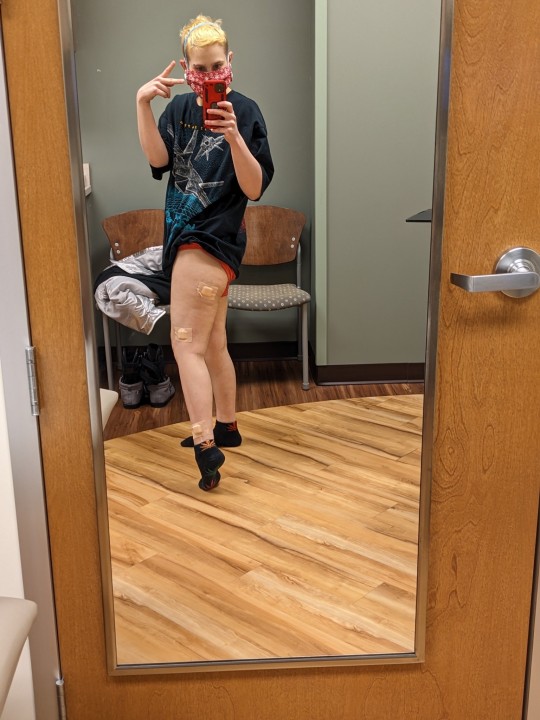#small fiber neuropathy
Text
I recently found out most of my family has been questioning my pain for a long time. My great aunt had called my mom a while back and actually CRIED because my toxic aunt told her that I am not ill and I don't have pain, but that her sister has it so much worse than I do and can be excused from being here to comfort my grandmother during her mourning.
As well as others in my family because they see me not using my cane all the time. The thing is I have so much joint pain anymore it hurts to hold onto the cane to help me walk, so if I'm home or in someone else's house where there is ample places to sit down if needed, I'm not using it. It upsets my great aunt because she has seen me cry in pain and she has been on the phone with mom while hearing me cry as my mom rubbed pain cream on my back.
Sometimes I imagine what people would say if they could physically see the issues. If they could see redness from the pain I feel inside, the could see the bone spurs stabbing and the degenerative disc disease. The havoc on my colon from crohns and the pain in my uterus from an unknown reason. The migraines I get and the burning nerve pain that spreads across my legs and back. Would they even apologize? Would they even feel bad? I can almost hear the condescending tone now.
I personally don't care what they think or say, I know what's wrong with me (chromic pain wise at least). I feel bad for the people on my side who want to defend me, but can't tell the others how it feels because they don't completely know. It sucks there are people out there so bent on making people with chronic pain feel so guilty about something we can't control, just because they don't believe in it. I had one family member hug me recently and they did it too rough and I hissed and said "gently please" and they responded "I barely touched you, I thought you were getting better?" "No, just management. This won't get better, ever" and it blew their minds that there isn't something that will help. Then their husband asked me "is it contagious?" Umm...no? Who makes these people? Those are the people who need to be followed and randomly punched through the day and as the pain subsides from that punch, BAM, ANOTHER ONE. ALL...DAY.
It's just infuriating and completely unfair.
#skully's life#fibromyalgia#type 1 diabetic#scoliosis#small fiber neuropathy#arthritis#bone spurs#chronic pain#chronic illness#crohns disease
8 notes
·
View notes
Text


#gothic#goth girl#goth gf#silver hair#cripple punk#small fiber neuropathy#erythromelalgia#grey hair#grunge#grungy aesthetic#vampire
12 notes
·
View notes
Text
hot take, you shouldn’t make someone travel if you know that it could cause a medical emergency
#i love my mother#hot enbys have chronic illnesses#medical rant#bpd rant#bpd vent#chronic illness#chronic fatigue#pots#hypermobile ehlers danlos#hypermobile eds#sfn#small fiber neuropathy#chronic migraine#family bullshit
3 notes
·
View notes
Text
SFN makes me lose my feeling in my hands and feet. And it feels as if I‘m losing my humanity, too.
8 notes
·
View notes
Text
I wrote this last year. I didn't have the energy to write up something new for this year, even though I have at least one new rare disease diagnosis, possibly more than one. (I'd have to look up whether or not some things are considered rare.)
Please read and spread the word about rare diseases! Feel free to comment/reblog to share your own rare disease diagnoses.
#rare disease day#rare diseases#february 28#february 29#papilledema#optic nerve drusen#small fiber neuropathy#postural orthostatic tachycardia syndrome#POTS#mantle cell lymphoma
10 notes
·
View notes
Text
Chronisch Kranke Menschen haben gelernt sich nicht zu beschweren... denn nur wenige haben Verständnis.
#depressiv#chronisch#krankheit#crohn's disease#fibromyalgia#small fiber neuropathy#crohnie#crohnsandcolitis#ptbs
2 notes
·
View notes
Text
Woke up this morning with a paralyzed left leg and sat in bed contemplating my options before I fell asleep then woke up and now it works again.
Turn it off and on again also works for people, apparently.
#skulls speaks#sfn#small fiber neuropathy#nerve disorder#medical stuff#my thigh hurts like a bitch now so i think it just got pinched???? idk#chronic pain#disability
5 notes
·
View notes
Link
3 notes
·
View notes
Text
I have been struggling with depression lately, but it’s mostly related to my struggles with chronic illness and the lack of support I have from my medical providers. I need to start this aloud so I know that it’s situational and that it’s not my fault.
Also, I need a new therapist who can better acknowledge that it isn’t for my lack of trying. Having a neurotypical and abled therapist is draining and sometimes makes me feel like I’m being gaslit. And that’s not ok.
I’m looking for a new therapist but that takes time and more patience than I can sometimes muster with the US healthcare system and state insurance/Medicaid. Do not recommend the American healthcare experience, 0/10 rating, no stars.
I’m not okay right now and that has to be okay for now.
#spoonie#autism#chronic illness#chronic pain#disability#dysautomnia#fibromyalgia#neurodivergent#autistic#keratoconus#small fiber neuropathy#neurodiverse stuff#neurotypical#therapist#therapy#not okay#depression#situational depression#ADHD#audhd#actually audhd#overwhelmed#us healthcare sucks#i’m tired#chronic fatigue#chronic fаtiguе ѕуndrоmе#self diagnosing#self diagnosing is valid#lack of support#medical professionals
7 notes
·
View notes
Text
3 more weeks until I find out if I have small fiber neuropathy, 2 until my tilt table, and just after that is a 3 week long heart monitor and genetic testing for my ehlers danlos syndrome. With my personal and family history of heart problems is giving major classical/vascular vibes. It's all being done at Loyola which isn't my usual place so that's kinda fun. It's a bit of a hike though so I hope it's not the new normal.


#pots#postural orthostatic tachycardia syndrome#orthostatic hypotension#ehlers danlos syndrome#genetic testing#small fiber neuropathy#hypermobile ehlers danlos#ceds#heds#veds
6 notes
·
View notes
Text
Had anyone noticed their chronic pain constantly changing? One month, you might have burning nerve pain, and then it's so much pressure and aching that you can't take it. It feels so hard to pinpoint one pain over another, and I'm not sure if it's because my body is trying to adapt to one pain and another presents itself in its place or if it's just actually changing depending on environment...maybe both?
I'm always telling my mom that my pain changes and I can't get her to understand why. For a while, it made me feel like I was making it up. Mom has noticed that every year, I have a different pain issue. Last year, it was nerve pain, and while I still have a lot of issues with nerve pain, it's managed better with meds and topical ointments. This year is the year for unknown joint pain. No one can figure out why my joints hurt so badly, and my blood work shows no signs of rheumatoid arthritis. My rheumatologist has said if it's not rheumatoid arthritis then she can't help me. I think I might have a hyper mobility issue, but she cant/wont do anything to help me find out about it. I've just been trying to keep it calm with pain foams and ointments, but I like to draw and read, and it's so hard to hold a pencil sometimes, not to mention holding a physical book.
Sometimes, I would rub my mom's back, and especially when all this started, my joints would crack at the slightest pressure, and she said she could FEEL my fingers like they were coming apart. I didn't feel it, but she did. I do feel my hips feel like they would click out of joint sometimes if I walk a lot, especially on my period (one of the reasons I'm getting a hysterectomy, I hate how it feels). I told all my doctors and they all said go to a rheumatologist, so I told her and she said go to a geneticist because if it's not RA she doesn't know what to do. If I had known she was going to be so useless I wouldn't have gone to her and went to someone else -_-
#skully's life#fibromyalgia#chronic pain#arthritis#crohns disease#skully talks#chronic illness#scoliosis#joint pain#small fiber neuropathy#nerve pain
6 notes
·
View notes
Link
From 2021.
Patients with myalgic encephalomyelitis/chronic fatigue syndrome (ME/CFS) present with a range of symptoms including post-exertional malaise (PEM), orthostatic intolerance, and autonomic dysfunction. Dysfunction of the blood vessel endothelium could be an underlying biological mechanism, resulting in inability to fine-tune regulation of blood flow according to the metabolic demands of tissues. The objectives of the present study were to investigate endothelial function in ME/CFS patients compared to healthy individuals, and assess possible changes in endothelial function after intervention with IV cyclophosphamide.
Symptoms frequently present following an event such as infection, physical trauma or exposure to environmental factors (4), and there is evidence of a genetic predisposition (8, 9). Research suggests the involvement of the immune system (10, 11), an impaired energy metabolism (12–14) and alterations in the gut microbiome (15). Orthostatic intolerance and autonomic dysfunction are also frequently reported, and can present with symptoms such as light-headedness, nausea, concentration difficulties, sweating, palpitations, dyspnea, and chest pain after prolonged sitting or standing.
It has been suggested that a dysfunction of the blood vessel endothelium could be a contributing mechanism, possibly associated with inadequate fine-tuned regulation of blood flow according to the metabolic demands of tissues (16, 17). One possible explanation for such endothelial dysfunction could be a reduced bioavailability of nitric oxide (NO) derived from endothelial cells. NO is a messenger molecule and neurotransmitter with important effects on vasodilation, thus contributing to the regulation of blood flow to tissues. NO is involved in many biologic processes, including effects on cognitive function, smooth muscle tone in the gastrointestinal and urogenital tracts, cardiac contractility, skeletal muscle and mitochondrial function (18, 19). Non-invasive measures for endothelial function include flow-mediated dilation (FMD) of the large arteries, which is believed to reflect the release of NO from endothelial cells caused by shear stress in vessel walls (20–22). As part of an FMD investigation, it is recommended to also measure endothelium-independent vasodilation, reflecting smooth muscle function, through the administration of sublingual nitroglycerin (20, 21). In the microcirculation, the measure post-occlusive reactive hyperemia (PORH) is understood to represent a more complex response involving nervous and myogenic responses as well as several vasodilators including NO (23).
There is growing evidence for endothelial dysfunction in autoimmune diseases (20, 24, 25) and fibromyalgia (26). However, research into blood vessel function in ME/CFS is limited so far. A study by Newton and colleagues (16) showed reduced FMD and PORH in a group of ME/CFS patients compared to healthy controls. This finding was confirmed by Scherbakov et al. who reported peripheral endothelial dysfunction in 18 of 35 (51%) ME/CFS patients compared to 4 of 20 (20%) healthy controls. This study also indicated a correlation between endothelial dysfunction and disease severity (17). In contrast, another study of 24 ME/CFS patients and 24 sedentary controls, using a different assessment method, found no significant difference in peripheral endothelial function at rest or after exercise (27).
This study investigated endothelial function in ME/CFS, and was the first to describe the changes in endothelial function before and after therapeutic intervention with IV cyclophosphamide in ME/CFS patients. Endothelial function measurements at baseline indicated that at the group level, the patients had significantly reduced large and small vessel endothelial function compared to healthy individuals, in line with results from previous studies (16, 17). Although more than half of the patients met the criteria for clinical response during the study, we were unable to detect any significant associations between clinical response and changes in endothelial function from baseline to 12 months follow-up.
Flow-mediated dilation (FMD) is the “gold-standard” method for large vessel endothelial function assessment (21), and the measurements have followed a well-established protocol.
One might speculate that endothelial dysfunction in ME/CFS could be associated with inadequate autoregulation of blood flow according to the demands of tissues, with resulting local hypoxia and lactate accumulation upon limited exertion. The clinical symptoms of ME/CFS suggest inadequate regulation of autonomic functions including blood flow. In a recent study of invasive cardiopulmonary exercise testing in upright position in ME/CFS patients, two types of peripheral neurovascular dysregulation were demonstrated; reduced cardiac output due to impaired venous return with low ventricular filling pressure (“preload failure”), and arterio-venous shunting with impaired peripheral oxygen extraction (53). These physiological changes are plausible contributors to several hallmark symptoms of ME/CFS, such as post-exertional malaise, and are associated with microcirculatory dysregulation, possibly related to small-fiber neuropathy (53).
Measures of known metabolites associated with endothelial function in cardiovascular diseases (Arg, hArg, ADMA, and SDMA) showed no significant differences between ME/CFS patients and healthy controls. This may argue for a different mechanism underlying the observed endothelial dysfunction in ME/CFS. We speculate that among ME/CFS patients, many of whom are relatively young women, the endothelial dysfunction could be related to an initial abnormal immune response, rather than atherosclerosis.
Further research is required in order to reach firm conclusions on any possible associations between ME/CFS symptoms and endothelial function. Future studies should aim to integrate objective activity measures as a supplement to validated patient-reported outcome measures, in order to control for the effect of physical activity or inactivity.
In conclusion, this study showed an association between ME/CFS and reduced endothelial function, both in large vessels assessed by FMD, and in small vessels by PORH. In this relatively small study, there were no significant associations between clinical response after cyclophosphamide and changes in FMD or PORH. Continued research efforts are warranted to further understand the possible circulatory disturbances involved in ME/CFS.
#ME/CFS#MECFS#chronic fatigue syndrome#cyclophosphamide#vasculitis#endothelial dysfunction#science journal#small fiber neuropathy
1 note
·
View note
Text
I finally got my EMG scheduled. It will be in early January. I'm *not* looking forwards to it at all... but I'm tired of nerve pain and tingling and shit.
I'm just not excited to get a test that sounds super uncomfortable and I know will likely come back negative because it sounds like this test is more to rule out regular neuropathy so they can test for SFN rather than a test for something that is suspected.
Still at least it's getting done
0 notes
Text
Oh Boy oh Boy we having spasms today.
Numbness, tingling, vibrations, and pain getting too boring I guess🤷🏻
#personal garbage#peripheral neuropathy#small fiber neuropathy#paresthesia#Pallesthesia#spasticity#chronicles of illness
0 notes
Photo




In case Twitter gets shut down, hi! I’m Karistina. On Twitter, I’m RealKaristina because Karistina was already taken.
I’m disabled and queer and I make generative art using Midjourney AI. Here are four of the images from my Abstract Femme set that I’m selling as PFPs over on Ko-Fi.
If we know each other from Twitter, please feel free to “introduce” yourself in a reply so I can match Twitter name to Tumblr name!
#lgbtq#fae#midjourney#aiart#disabledcreator#queer creator#actuallyautistic#sjogrens#mecfs#small fiber neuropathy#fibromyalgia#bisexual#polyamorous#disabledandcute#genderfae#introduction
4 notes
·
View notes
Text
That awkward neuropathy moment where one entire limb itches uncontrollably and severely enough that it can't be ignored and so you try to scratch or rub it to make it feel better but WATCH OUT because anything touching it feels like fire.
Ok maybe this was a bit too hyperspecific but I'd like to trade in my right leg please.
#disability#chronic pain#neuropathy#this nerve biopsy can't come fast enough#like i mean if it IS small fiber sensory neuropathy i don't think there's anything we can really do#that i haven't already done#but it'd be nice to have answers?
7 notes
·
View notes